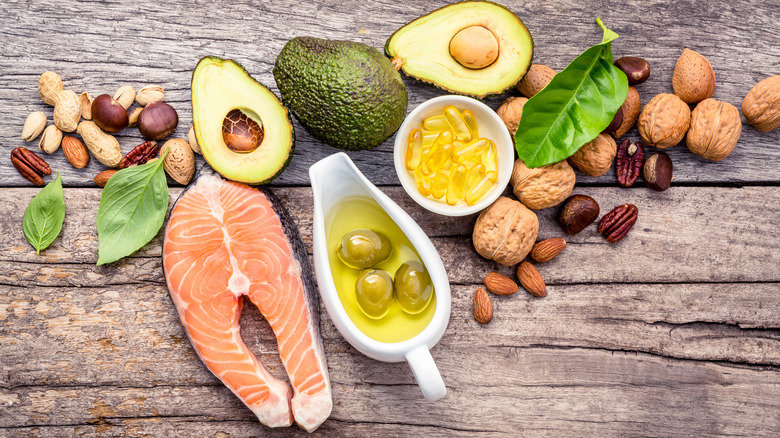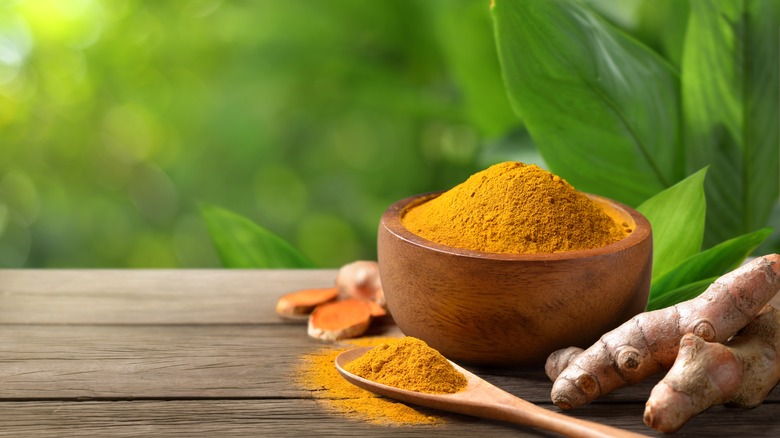The Best Anti-Inflammatory Foods To Help Carpal Tunnel
Carpal tunnel is a condition that can cause pain, tingling, and numbness in the hand and arm. The carpal tunnel is a narrow, tunnel-like passageway in the wrist that protects the median nerve (via Mayo Clinic). This nerve provides feeling to the thumb and first three fingers of the hand. The carpal tunnel is formed by bones and ligaments in the wrist. The median nerve runs through this tunnel from the forearm to the hand. The tendons that flex the fingers also pass through this space. If any of these structures swell or press on the median nerve, it can cause carpal tunnel syndrome.
The symptoms of carpal tunnel syndrome usually develop gradually and can range from mild to severe. Common symptoms include pain, tingling, or numbness in the hand and forearm, weakness in the hand or fingers, difficulty gripping objects, a feeling of pins and needles in the hand, and sleep disturbances due to pain. Treatment often begins with conservative measures, such as splinting the wrist or taking oral anti-inflammatory medications. If these treatments are not effective, corticosteroid injections or surgery may be required. Eating certain anti-inflammatory foods may also help the progression of carpal tunnel when combined with other treatment options. Here are some of the best anti-inflammatory foods to try.
Omega-3 fatty acids
These are found in fish oil and flaxseed oil. They help reduce inflammation throughout the body, including in the hands and wrists (via UC San Diego Health). Omega-3 fatty acids can be found in many foods, including salmon, tuna, mackerel, walnuts, and flaxseeds, according to Medical News Today. You can also take omega-3 supplements in pill form, but getting this nutrient from whole foods is the better option if possible.
In addition to helping with carpal tunnel, there are many other health benefits of omega-3 fatty acids. According to Healthline, omega-3s can help reduce the risk of heart disease, stroke, and arthritis. They may also improve cognitive function and mental health, like helping you fight anxiety and depression. Omega-3s are crucial for eye health and can reduce your risk of macular degeneration. They have also been shown to help children with ADHD by reducing symptoms, as well as helping fight symptoms of autoimmune diseases. They are also great for improving bone and joint health in people with conditions like osteoporosis and arthritis, and can keep your bones and joints strong even if you don't have one of these conditions.
Spinach
Spinach is high in vitamin B6, which is often prescribed to people with carpal tunnel syndrome, according to OrthoAtlanta. This vitamin is important for the nervous system, which is affected when you have carpal tunnel syndrome (via Mayo Clinic). There are many other health benefits of spinach as well. This superfood also contains calcium, potassium, and folate, as well as vitamins C, K, and A. It's also a great source of iron and magnesium (via Medical News Today). Spinach has been found to lower the risk of cancer as well as provide glucose control in people who are diabetic. It can also improve bone health.
Spinach can be eaten raw or cooked. It has a milder flavor when eaten raw and can easily be blended into a smoothie to help picky eaters get their veggies in. Spinach contains a lot of water and loses much of its volume when cooked, so be prepared to use a large amount when adding it to sauces or stir-fries. It is recommended that adult eats four to five servings of vegetables per day for the most health benefits (via Harvard Health Publishing). Few people actually eat this many veggies each day, so it is important to try to incorporate them into your diet whenever you can.
Red bell peppers
Red bell peppers are rich in antioxidants, which help control inflammation, according to Medical News Today. Antioxidants help prevent inflammation from occurring in the first place. Bell peppers contain several different antioxidants, including quercetin, luteolin, capsaicinoids, vitamin C, beta-carotene, and lycopene. These have been shown to protect brain cells and fight against diseases like cancer, diabetes, cardiovascular disease, Alzheimer's disease, and Parkinson's disease. Consuming bell peppers may also reduce your risk of developing rheumatoid arthritis.
Bell peppers contain many vitamins and minerals, according to Healthline. These include vitamins B6, K1, E, and A. They are high in vitamin C and provide 169 percent of your daily intake in a single pepper. They also contain potassium, which can improve heart health, and folate, which has many functions and is important during pregnancy. Bell peppers are a versatile ingredient and can easily be added to your diet. Many people enjoy eating them plain because of their crunchy texture and sweet flavor. Be sure to scrape out the seeds before eating, as these can be spicy.
Pineapple
According to Everyday Health, pineapple is another great food to eat if you have carpal tunnel syndrome because it contains an enzyme that helps to break down inflammation in the body. This can reduce some of the uncomfortable symptoms you may feel if you have the condition. Pineapple has many other health benefits as well.
In addition to being rich in vitamin C, this fruit is a good source of thiamin, vitamin B6, folate, manganese, and potassium (via Medical News Today). These vitamins and minerals can help reduce the risk of developing high blood pressure, diabetes, and certain cancers. Because pineapples are high in fiber and water, eating them can aid digestion. However, you have to be careful not to eat too much at a time. Pineapple contains an enzyme called bromelain that has tenderizing properties that can irritate your mouth and stomach if you eat too much (via Livestrong). But when eaten in moderation, pineapple is a great fruit to add to your diet.
Turmeric
Turmeric is a spice that has been used in India for centuries. It has many health benefits, including the ability to reduce inflammation (via Healthline). This can help relieve some of the symptoms associated with carpal tunnel syndrome. Turmeric also contains curcumin, which is an antioxidant that helps protect cells from damage. Curcumin has been shown to boost brain function, lower the risk of heart disease, and fight against cancer. Other benefits of turmeric include its ability to improve digestion, reduce arthritis pain, and protect against Alzheimer's disease.
Be careful when using turmeric, as it can leave a yellow stain on countertops and clothing. It can also cause an upset stomach if you eat too much of it. Start by adding a small amount to your food and gradually increase the amount you use over time. You can also take it in supplement form. If you take turmeric supplements, make sure to talk to your doctor first as they can interact with certain medications.






